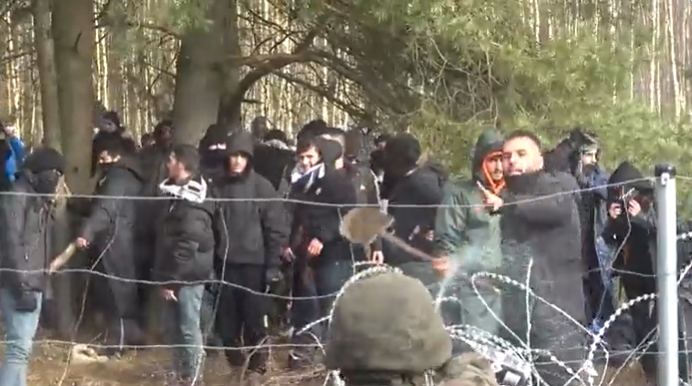Germany has praised Poland’s response to the latest escalation in the crisis on the European Union’s border with Belarus, where over 2,000 people yesterday gathered on the Belarusian side. Berlin also called on the European Commission to take action against the “hybrid threat” that is being supported by Russia.
The situation has prompted expressions of concern from a number of other countries, including the United States, as well as condemnation of Belarus’s orchestration of the crisis and support for Poland in responding to it.
That’s what the situation looks like now from the Belarusian side. Migrants are using trees to try to force the border. pic.twitter.com/sfAHSQ8bVl
— Tadeusz Giczan (@TadeuszGiczan) November 8, 2021
“The Poles have reacted correctly so far,” Horst Seehofer, the German interior minister, told Bild. “We need the structural security of borders. We have to publicly support the Poles! We can’t criticise them for protecting the EU’s external border with permissible means….[They] are doing a very important service for the whole of Europe.”
Tens of thousands of people – mostly from the Middle East, Asia and Africa – have attempted to cross into Poland from Belarus this year. Thousands have made it through, and most of those not detained by Polish authorities have travelled on to Germany.
The crisis reached a new stage yesterday when a large column of people – accompanied by the Belarus authorities – arrived at the border. Some then unsuccessfully attempted to force their way through, before setting up camp. A Polish government spokesman called it “the most difficult situation since the beginning of the conflict on the border”.
Speaking in parliament this afternoon, the prime minister, Mateusz Morawiecki, repeated his government’s claims that Russia stands behind the crisis. “This is being implemented by the Lukashenko regime, but the main decisionmaker here is Vladimir Putin,” he said, quoted by Onet.
Służbom MSWiA i żołnierzom udało się zatrzymać pierwszą masową próbę sforsowania granicy. Obecnie migranci rozbili obóz w rejonie Kuźnicy. Są cały czas pilnowani przez białoruskie służby. pic.twitter.com/IpP0wdPXhC
— Ministerstwo Obrony Narodowej 🇵🇱 (@MON_GOV_PL) November 8, 2021
“I appeal to the European Commission to take action,” added Seehofer. “EU states must stand together here because Lukashenko, with the support of Russian President Vladimir Putin, is using the fate of people to destabilise the West…Poland and Germany cannot cope with this on their own.”
Asked if he supported the deportation of border crossers back into Belarus – a practice Poland has been conducting – Seehofer said that he does.
“We want orderly immigration to Europe, not politically organised immigration,” he continued. “We call what is happening now a hybrid threat, where people are used to destabilise the EU and especially Germany…[We] must rely on the entire democratic world to support our policies.”
The situation at the border – and the actions of Polish authorities there – are difficult to independently verify as the government has banned the media and NGOs from entering the area.
"We are concerned about images and reports coming from the Belarusian-Polish border. The United States strongly condemns the Lukashenka regime for facilitating illegal migration flows. We urge him to immediately stop," says the US @StateDept https://t.co/BnJUwXI03x
— Notes from Poland 🇵🇱 (@notesfrompoland) November 8, 2021
Yesterday, the European Commission president, Ursula von der Leyen, pledged more support for Poland – as well as to Lithuania and Latvia, which also border Belarus – in dealing with the surge in attempted crossings.
“Belarus must stop putting people’s lives at risk; the instrumentalisation of migrants for political purposes by Belarus is unacceptable,” she declared, adding that the EU would explore “sanction[s], including through blacklisting third-country airlines that are active in human trafficking”.
Poland has insisted, however, that it is capable of handling the situation at the border without the involvement of the EU’s border agency, Frontex. This afternoon, Poland’s president, Andrzej Duda, said that the country has “sufficient strength and resources to physically protect the border”.
However, “we do need support at the political level, and we are very much counting on the support of our neighbours and allies”, he added, naming the EU and NATO in particular.
In response to yesterday’s escalation, the US State Department said that it was concerned at the “disturbing images and reports emanating from the Belarus-Poland border”.
The US “strongly condemns the Lukashenko regime’s political exploitation and coercion of vulnerable people and the regime’s callous and inhumane facilitation of irregular migration flows across its borders”, said spokesman Ned Price.
This afternoon, France also accused Belarus of “seeking to destabilise the EU”, while the Netherlands and Finland are among other member states to have criticised Minsk.
Last week, NATO declared that “the use of migrants by the Lukashenko regime as a hybrid tactic is unacceptable” and expressed support for Poland, Lithuania and Latvia. The latter two countries yesterday pledged to provide help to Poland in tackling the latest surge in attempted crossings.
Discussed with @GitanasNauseda
Using vulnerable migrants as part of a hybrid attack is beyond contempt.
The #EU will not accept any attempt to instrumentalise migrants.
Full solidarity with EU Member states.
Member states’ borders are EU borders.
— Charles Michel (@eucopresident) November 9, 2021
Main image credit: MON_GOV_PL/Twitter (screenshot)

Daniel Tilles is editor-in-chief of Notes from Poland. He has written on Polish affairs for a wide range of publications, including Foreign Policy, POLITICO Europe, EUobserver and Dziennik Gazeta Prawna.




















